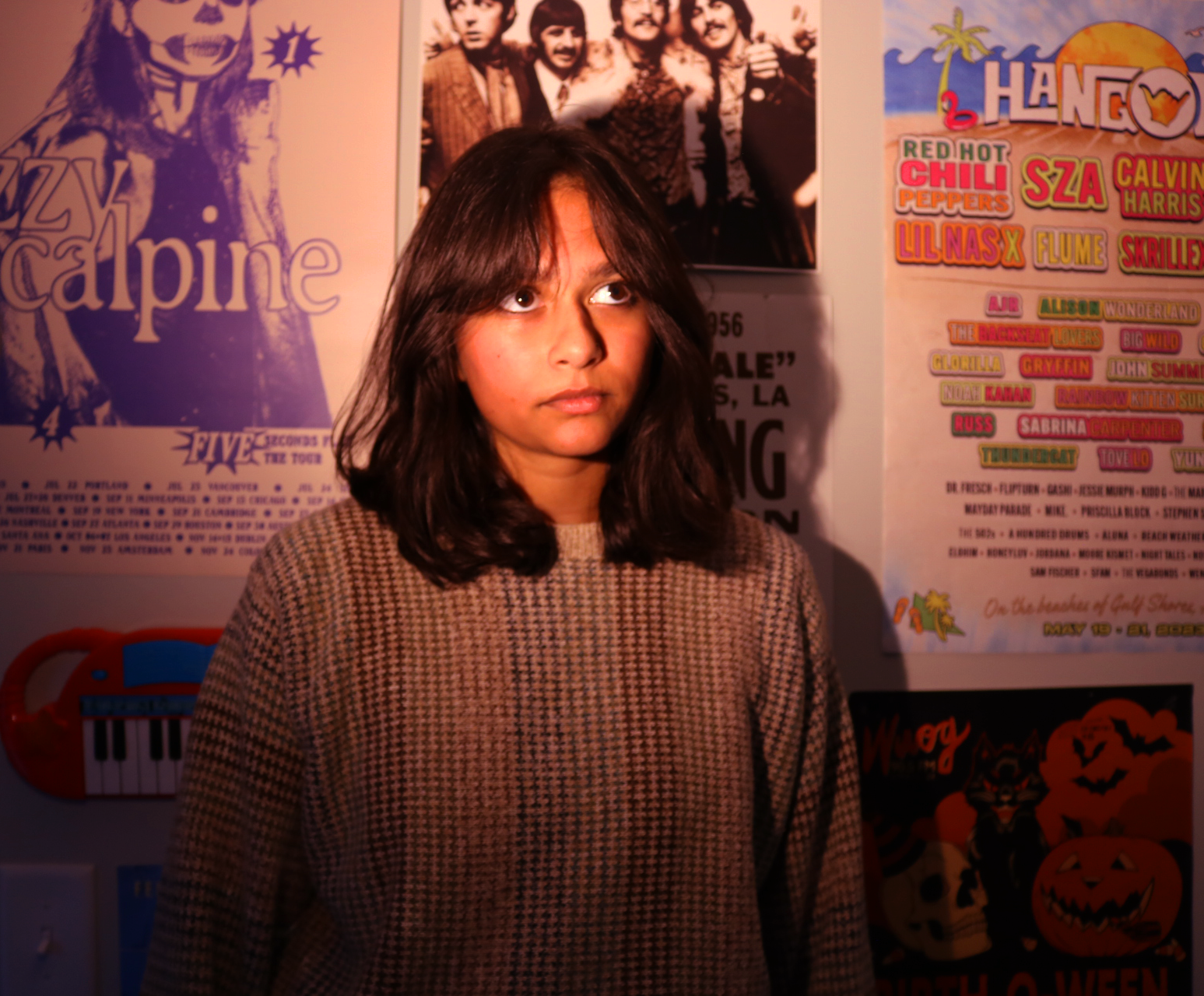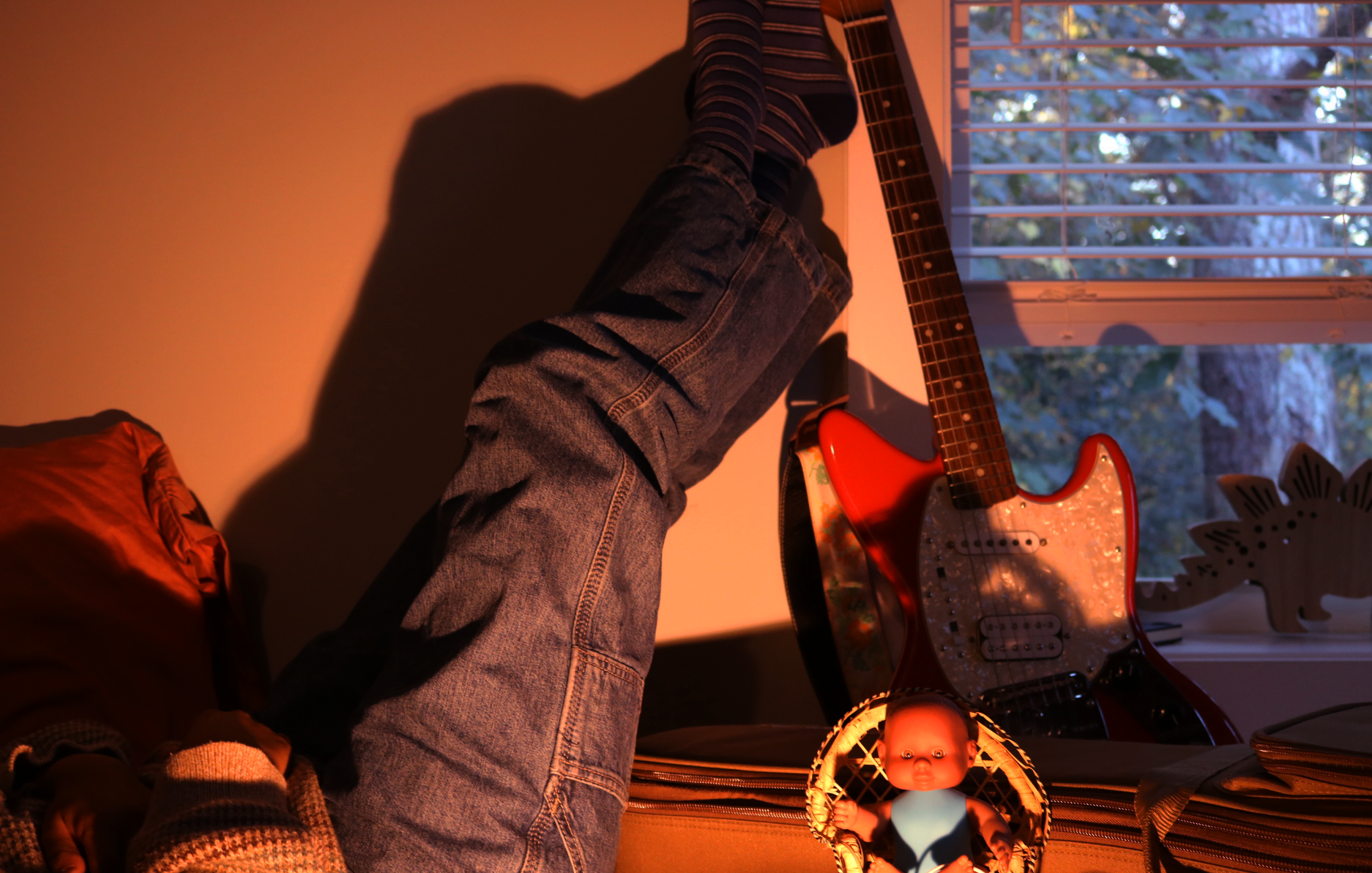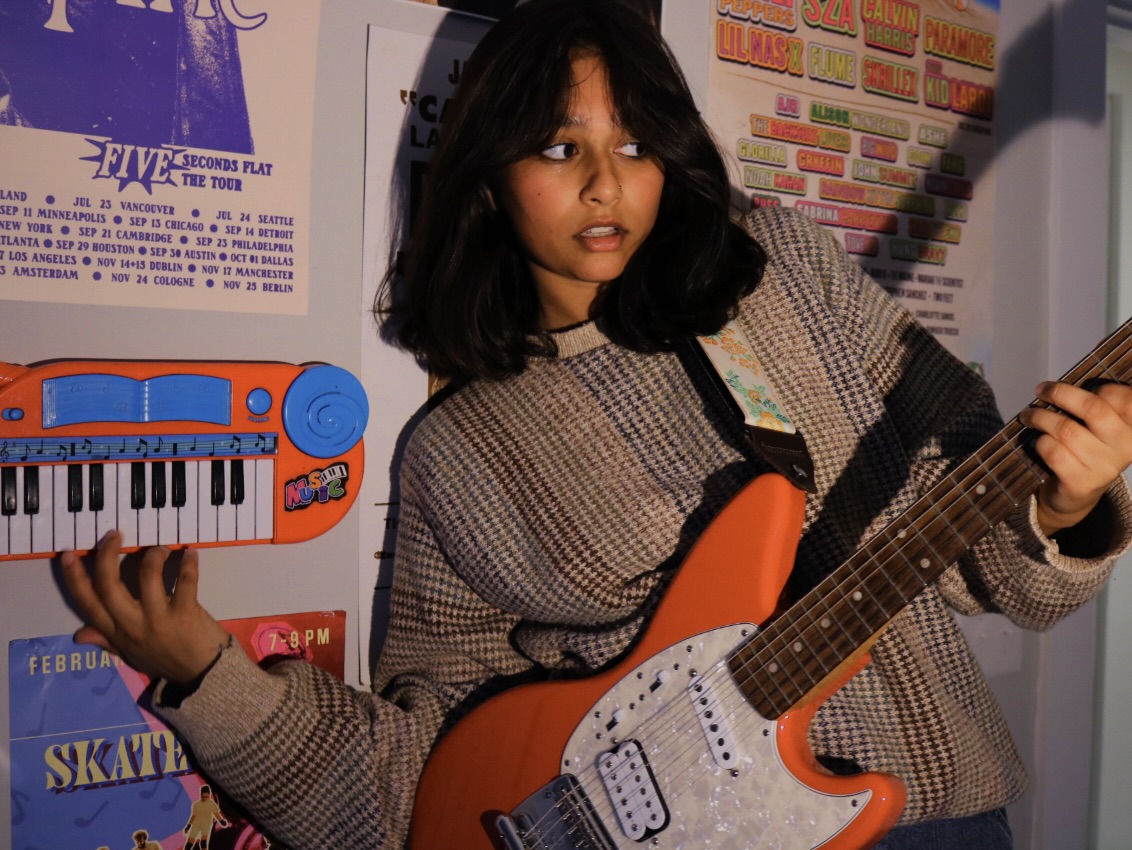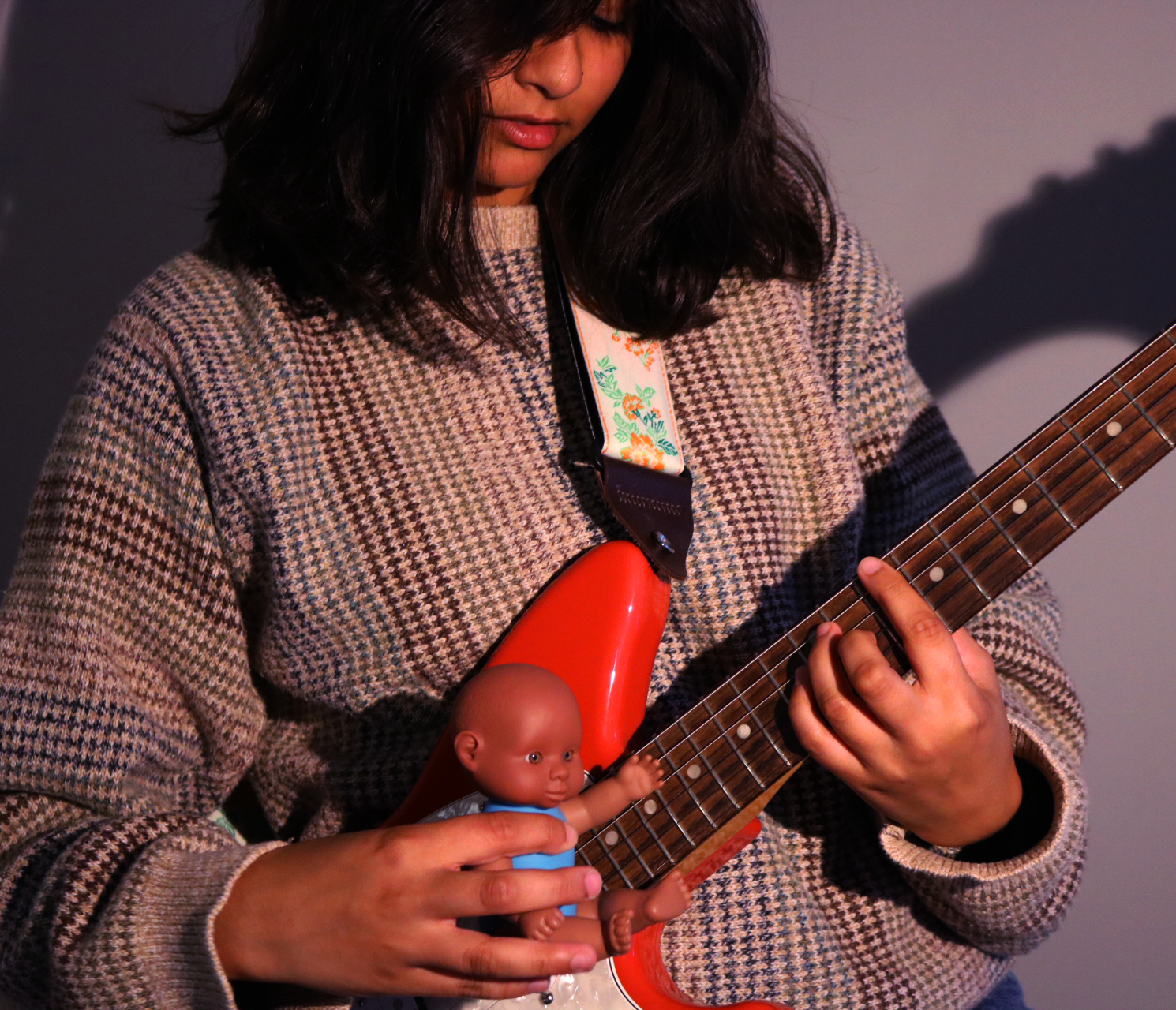

As a songwriter, producer, multi-instrumentalist, marketing student, and music teacher, Ritika Sharma wears many hats. Growing up in Alpharetta, Georgia, she started playing classical piano at age 4, the origin of her life in music. At 10 years old, inspired by the Hannah Montana movie, she began playing guitar, setting into motion her obsession with learning instruments. Flute, violin, bass, drums, ukulele, and harmonica were soon added to the mix, self-taught.
She says that “instruments are like languages, each with its own texture,” and despite their difference,she has been able to “connect the language into one.” Not just a speaker but also a creator of this language, Ritika began writing songs on guitar at age 10
making music only in private, she discovered the creativity of the Athens music scene upon attending the University of Georgia, inspiring her to branch into sharing her works. Her other talents have flourished equally from her musical abilities. She says it’s primarily creativity from her musical endeavors that informs her work in marketing, and her life of musical variety has sparked her willingness to take on new, unknown projects, like recent work behind the scenes at music festivals. For Ritika, music always seems to be present, even when it doesn’t take center stage.

Ritika defines music as “telling a story through a couple of notes.” As the musician, her role is the storyteller. She believes that storytelling offers a unique ability to see the world from a variety of perspectives, understanding that this world isn’t about you alone. She makes time for this practice every day, comparing it to a muscle that needs to be exercised. “The song a day thing is to keep my mind fresh. It’s like muscle memory. I’ll be walking to the library and I’ll hear a melody in my head and record it, and then when I get home I’ll do something with it.” As a self-proclaimed people-watcher, it’s these songs that become the medium for her stories, the little moments she witnesses every day. “It’s almost like a journal... this is what happened today.” Her instrument of choice, guitar, reflects this dedication to sharing people’s stories:“Guitar is such a good instrument for songwriting because it just travels differently than other instruments. If I was starting off learning chords, they didn’t tell a story. It was just four chords over and over again so you almost needed words to say anything.” The words may tell the story, but the instrument releases them.
In Ritika’s music, the instrument takes on another role in transmitting stories: enmeshing them in sonic worlds. Creating worlds is a central part of her production process. “Usually lyric come first for me... and then I mesh them into the world I want them to be in.”Sometimes it’s one lyric that helps her access these new musical worlds, but other times it’s a sound.
This is how her most recent release, “For the Fish,” came about: “[It] came out randomly because I had a guitar that I put a tennis dampener on and it created this really cool sound. It was very airy and almost felt like the ocean, so I genuinely just started writing about water and those themes because that’s what the guitar sounded like to me. I started adding harmonies and they resembled sirens, and I realized I could create this whole underwater-scape with these sounds.” In a musical
world that often prioritizes either the lyrical or the musical, Ritika finds pride in her focus on the sound and the story.
![]()
“With my music, you can take away the words and the production stands by itself, and you can take away the production and the words stand by themselves, and that’s a test for me.” Whether inspired by a lyric or a sound, sonic worlds encompass Ritika’s stories, enveloping them into spaces of meaning and purpose.
![]()
In Ritika’s quest to create music, sharing the stories of others is also firmly wrapped up in her own story, requiring the creation of music that is true to herself. This is something she hold onto actively, resisting the power of exterior pressures to dampen her personal musical expression. While there is a standard of songs being 2-4 minutes, hers range from 1-8, depending on the complexity of the story being told. Some of her favorites are only a minute long. As she says, “there aren’t really any rules anymore.” Her personal sound follows a similar trend, resisting genre conventions: “The songs I’m making now, I genuinely haven’t heard it from anybody else. I don’t know what it is genre-wise, and it genuinely feels like my sound. Before I could define it but now I really can’t and I think that’s cool.” Following the ebbs and flows of her own life, her music has become a time capsule of her own story as she tells those of so many.
Since her beginnings on piano more than 16 years ago, Ritika has been doing just that: finding a way of making music that’s true to her. Along this path, this expression has branched into the many talents she possesses today. Producing, singing, playing instruments, and writing songs, Ritika’s got a lot of hats to wear. But, as she said best, “I’m just going to make sure the hats are the prettiest they can be.” As a storyteller, world-builder, and expresser of her truest self, it’s not hard to see that she’s succeeding.
world that often prioritizes either the lyrical or the musical, Ritika finds pride in her focus on the sound and the story.

“With my music, you can take away the words and the production stands by itself, and you can take away the production and the words stand by themselves, and that’s a test for me.” Whether inspired by a lyric or a sound, sonic worlds encompass Ritika’s stories, enveloping them into spaces of meaning and purpose.

In Ritika’s quest to create music, sharing the stories of others is also firmly wrapped up in her own story, requiring the creation of music that is true to herself. This is something she hold onto actively, resisting the power of exterior pressures to dampen her personal musical expression. While there is a standard of songs being 2-4 minutes, hers range from 1-8, depending on the complexity of the story being told. Some of her favorites are only a minute long. As she says, “there aren’t really any rules anymore.” Her personal sound follows a similar trend, resisting genre conventions: “The songs I’m making now, I genuinely haven’t heard it from anybody else. I don’t know what it is genre-wise, and it genuinely feels like my sound. Before I could define it but now I really can’t and I think that’s cool.” Following the ebbs and flows of her own life, her music has become a time capsule of her own story as she tells those of so many.
“I don’t really want to say I’m a serious artist or I’m a fun artist, I just want to make what’s current to me.”
Since her beginnings on piano more than 16 years ago, Ritika has been doing just that: finding a way of making music that’s true to her. Along this path, this expression has branched into the many talents she possesses today. Producing, singing, playing instruments, and writing songs, Ritika’s got a lot of hats to wear. But, as she said best, “I’m just going to make sure the hats are the prettiest they can be.” As a storyteller, world-builder, and expresser of her truest self, it’s not hard to see that she’s succeeding.